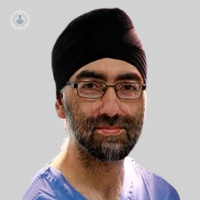Valvular heart surgery: Exploring your treatment options
Written in association with:Valvular heart surgery is a critical surgical intervention designed to treat severe heart valve disorders.
Mr Moninder Bhabra, distinguished consultant cardiothoracic surgeon, provides a comprehensive overview of heart valve surgery, detailing the indications for the procedure, the different surgical options available, and the expected outcomes.

What are the indications for valvular heart surgery?
Valvular heart surgery is required for patients with severe heart valve disorders, including stenosis and regurgitation.
The heart has four valves (the aortic, mitral, pulmonary, and tricuspid valves) that regulate blood flow through its chambers and into the body. If a valve is damaged or diseased, this can lead to two main types of dysfunction: stenosis and regurgitation.
Stenosis occurs when a valve becomes narrowed, restricting blood flow. Conversely, regurgitation happens when a valve fails to close completely, causing blood to flow backward into the heart chambers. Both of these conditions can lead to serious complications.
Symptoms that indicate the need for surgery often include shortness of breath, fatigue, chest pain, and swelling in the legs or abdomen. Diagnostic assessments typically include imaging studies such as echocardiograms, which can reveal the extent of heart valve dysfunction.
What are the most common types of valve repairs and replacements?
The two main types of valvular heart surgery are valve repair and valve replacement.
Valve repair
Valve repair is often the preferred method, because it preserves the natural valve, minimising the need for long-term anticoagulation therapy.
During surgery, your cardiothoracic surgeon will employ specialised surgical techniques, such as annulus resizing, leaflet repair, or chordae tendineae reconstruction, to reshape the valve, remove excess tissue, or reinforce the structure. Your cardiothoracic surgeon will often utilise minimally invasive techniques, which involve smaller incisions and result in a quicker recovery time.
Valve replacement
When repair isn’t possible, valve replacement will be necessary. This procedure involves removing the damaged valve and replacing it with either a mechanical or biological prosthetic valve.
Mechanical valves are constructed from durable materials designed for longevity; however, you will require lifelong anticoagulation therapy to prevent blood clots. On the other hands, biological valves, which are made from tissue derived from living organisms, usually don’t necessitate long-term anticoagulation. However, they may have a shorter lifespan than mechanical valves, often needing replacement after 10 to 20 years.
Valve replacement can be performed through traditional open-heart surgery or minimally invasive surgery. In open-heart surgery, your heart will be temporarily stopped while the new valve is implanted, with a heart-lung machine ensuring circulation instead. With minimally invasive surgery, your cardiothoracic surgeon will operate through smaller incisions, resulting in faster recovery and reduced postoperative pain.
How long is the recovery period after valvular heart surgery?
The recovery period after valvular heart surgery will vary, depending on the type of surgery performed, as well as your age and overall health. Generally, patients can expect to stay in the hospital for three to seven days following the procedure, during which you will be closely monitored for any complications.
Once you are discharged, it’s common to experience fatigue, discomfort, and limited range of motion during the initial recovery phase. Most patients will gradually resume their normal activities within six to twelve weeks.
Following your cardiothoracic surgeon's recommendations is crucial, as is attending follow-up appointments and participating in any prescribed cardiac rehabilitation programmes. These programmes are designed to help you safely regain strength and endurance, supporting a return to your daily activities.
What are the long-term outcomes and success rates?
Valvular heart surgery has a high success rate, which often exceeds 90% for both valve repair and replacement procedures. Many patients report a significant decrease in symptoms and an improvement in their quality of life and overall heart function, after the surgery.
It’s essential to have regular follow-up appointments with your cardiothoracic surgeon to monitor heart function and the performance of the valve over time.
If you would like to book an appointment with Mr Moninder Bhabra, head on over to his Top Doctors profile today.


